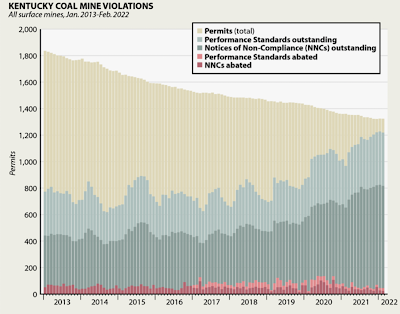 |
| Permits and violations at surface coal mines in Kentucky, 2013-February 2022 (Inside Climate News graph from Ky. Energy and Environment Cabinet data) |
"Environmental advocates fear lax enforcement could also be happening in other coal mining states, such as West Virginia, Virginia and Pennsylvania, due to similar pressures on the industry and regulators, despite a recent uptick in coal mining," Bruggers reports. "And they are calling on federal regulators to make sure slowed, idled or bankrupt mines are not left to deteriorate."
Kentucky enforcement data from 2013 through February and recent internal emails "reveal an agency struggling to enforce regulations designed to protect the public and the environment from some of the industry’s most destructive practices amid mining company bankruptcies and an overall industry decline that has also seen the shedding of thousands of coal mining jobs in the state," Bruggers writes.
The data show there are many "zombie mines" that are no longer operating but have not been reclaimed as the law requires. "In one Dec. 15 email, a state official noted that the number of notices of noncompliance with surface-mining regulations statewide had reached a record high of 810 the previous month," Bruggers reports. "The increase came even though the number of active mining permits had declined 28 percent since 2013, a year when there were roughly half as many unresolved violations despite more mining activity."
Courtney Skaggs, a senior environmental scientist in the state Department for Natural Resources, warned a state official in a December email that the zombie-mine situation is "completely out of control" and will "blow up in someone's face." In another email to an official in the state Energy and Environment Cabinet, which oversees environmental regulations, Skaggs said the state was not addressing the problems and warned: "Something has to give/change before we have a major problem on our hands." A department spokesperson told Bruggers the enforcement lag was because of "an unprecedented number of bankruptcies caused by market forces in the coal industry that are outside of the control of (the cabinet)."
More than half the unresolved violations in Kentucky are for mines operated by companies that have gone bankrupt. The violation notices kept piling up after December, hitting 1,219 by the end of February. An attorney who represents a landowner affected by an unreclaimed mine told Bruggers he believes the agency doesn't have much power over mining companies that are going bankrupt or not expanding much. That's because the state's main enforcement power is to deny new mining permits; if mining companies aren't seeking new permits, they might not care much.
No comments:
Post a Comment